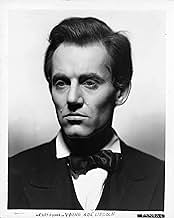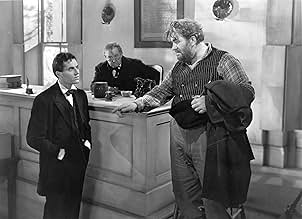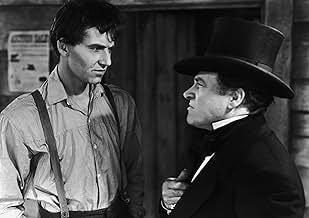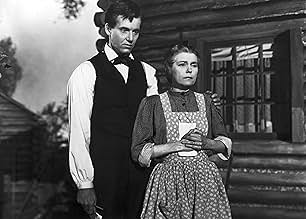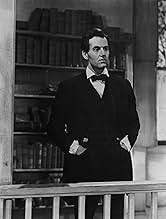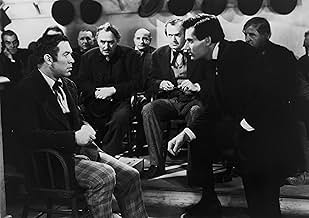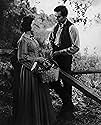Dramatización de la juventud del presidente estadounidense Abraham Lincoln, cuando era un joven abogado enfrentándose a su caso más dificil hasta el momento.Dramatización de la juventud del presidente estadounidense Abraham Lincoln, cuando era un joven abogado enfrentándose a su caso más dificil hasta el momento.Dramatización de la juventud del presidente estadounidense Abraham Lincoln, cuando era un joven abogado enfrentándose a su caso más dificil hasta el momento.
- Dirección
- Guión
- Reparto principal
- Nominado para 1 premio Óscar
- 6 premios y 2 nominaciones en total
- Carrie Sue
- (crédito solo)
- Man with Lynch Mob
- (sin acreditar)
- Townsman Dancing at Party
- (sin acreditar)
- New Salem Townsman
- (sin acreditar)
- Carrie Sue
- (sin acreditar)
- Peach Pie Baker
- (sin acreditar)
- Loafer
- (sin acreditar)
Reseñas destacadas
The film concerns two young men, brothers, on trial for a murder that both claim to have committed. In classic angry mob style, the town decides to take justice into their own hands and lynch the pair of them, until honest Abe steps into the fray. He charms them with his humor, telling them not to rob him of his first big case, and that they are as good as lynched with him as the boys lawyer. What follows seems to become the outline for all courtroom- murder-dramas thereafter, as Abe cunningly interrogates witnesses to the delight and humor of the judge, jury and town before he stumbles upon the missing links.
The film plays out like many John Ford movies do: a tablespoon of Americana, a dash of moderate predictability, a hint of sarcasm that you aren't sure if you put in the recipe or if Ford did it himself. Despite the overtly 'Hollywood' feel of the film, and overly patriotic banter alluding to Lincoln's future presidency, the film is entirely enjoyable and enjoyably well constructed, if you can take your drama with a grain of salt.
Maybe that's why I love it. You can see Ford coming to terms with the grand, Griffithesque vision of America through its most complicated avatar, Lincoln. Ford's love for his country was more like Lincoln's than Griffith's, anyway: like Lincoln, he acknowledged the genius of the democratic experiment, but he was also aware of its dangers: mob rule and self-satisfaction. YML's greatest scenes are all about this.
First, there's the local parade Abe attends, surrounded by yahoos whom he loves but also sees for what they are. (We see him in another scene accepting a legal case from one of these -- and warily biting the coin offered him for a retainer.) Veterans of the recent War of 1812 and Indian Wars march through; the crowd is wild for them, Abe merely respectful.Then a agon of old men in tricorners is pulled through the parade route. No one seems to know who they are. Lincoln quietly informs his friends that they are veterans of the War for Independence -- and gravely doffs his stovepipe hat. His friends, mildly ashamed (it appears) of their prevous jingoistic glee, follow suit, and stand silent and hatless as the old men pass.
Then the mildly ludicrous plot -- about two brothers accused of another man's murder -- kicks in, and Abe goes to work. The scene where he confronts a lynch mob, putting his foot up against the log they're using for a battering-ram against the jailhouse door, is a classic by any standard. But note how Abe talks to the mob on its own level while remaining, in spirit, resolutely on his own higher plane. After appealing to their macho impulses by offering to "lick any man here," he delivers a house-divided speech that soothes their savagery and leaves them confused and irresolute. "Dontcha wanna put that log down now, boys?" he asks when they have been flummoxed by his eloquence. "Ain't it gettin' a mite heavy?"
Throughout Ford indulges in shameless historical foreshadowings that would have made Stephen Vincent Benet blush. Abe meets Mary Todd and Stephen Douglas; he rides down a dirt road with a bumpkin who's playing a new tune called "Dixie" on a jaw-harp. "Kinda makes you feel like marchin'!" says the bumpkin, as he and Abe ride through a muddy patch in the road.
The ending is impossible to describe without inviting derision, but I swear to you, it works. Having won his case, Lincoln allows as how he might take a walk -- "maybe to the top of that hill." As he trudges on, the skies send down rain and lightning -- and Abe seems to know what this is a prelude to.
I acknowledge the superiority of the great Ford films that came after, but I will always have a special place in my heart for "Young Mr. Lincoln." Independence Day (the federal day of observance, not the movie) is coming; you could do far worse than to watch this great film before the barbecue.
Excellent performance from Henry Fonda as idealistic ,traveller Springfield solicitor , he was to star regularly for John Ford from this movie , as ¨Grapes of wrath" ,"My darling Clementine" , and "Fort Apache¨. Besides, sterling acting by Alice Brady as grieved mother , she was a great actress from the silent cinema to early sound , but this one resulted to be her last movie because she early died due to cancer . The Lincoln's deeds developing make for skillfully appealing entertainment. His portrayal shows a nostalgic longing for things past and old values and describes his goodness , uprightness and willful . Lincoln , like John Ford, was a straightforward man who never varied the ideals of his youth . This American masterpiece is correct on both counts , as splendid biography and as magnificent drama.
Other biographies about Abraham Lincoln are the following ones : 1) ¨Abraham Lincoln¨(1930) by D. W. Griffith with Walter Huston , Una Merkel, talking about his birth until his assassination ; 2) ¨Abe Lincoln in Illinois¨(1940) by John Cromwell with Raymond Massey , Ruth Gordon, concerning similar events to Ford's film throughout his career as a lawyer 3) TV version titled ¨Gore Vidal's Lincoln¨ with Sam Waterston and Mary Tyler Moore as Mary Todd. And, finally, a recent version by Steven Spileberg with Daniel Day Lewis and Sally Field.
¿Sabías que...?
- CuriosidadesJohn Ford and producer Darryl F. Zanuck fought an extended battle over control of the film. Ford even had unused takes of the film destroyed so the studio could not insert them into the movie. One scene that Ford insisted on cutting was a scene where Lincoln met his future assassin, a very young John Wilkes Booth.
- PifiasLincoln is shown playing "Dixie" on a Jew's harp. That portion of the film is ostensibly set in the year 1837, but most reliable sources indicate that "Dixie" wasn't written, publicly performed nor published before 1859. During the Civil War, Lincoln was known to be partial to the tune (it was almost as popular in the North in the 1860s as in the South), but it's unlikely he would have heard it in the 1830s.
- Citas
Abe Lincoln: [cross-examining Cass] J. Palmer Cass.
John Palmer Cass: Yes, sir.
Abe Lincoln: What's the "J" stand for?
John Palmer Cass: John.
Abe Lincoln: Anyone ever call you Jack?
John Palmer Cass: Yeah, but...
Abe Lincoln: Why "J. Palmer Cass?" Why not "John P. Cass?"
John Palmer Cass: Well, I...
Abe Lincoln: Does "J. Palmer Cass" have something to hide?
John Palmer Cass: No.
Abe Lincoln: Then what do you part your name in the middle for?
John Palmer Cass: I got a right to call myself anything I want as long as it's my own name!
Abe Lincoln: Well then if it's all the same to you, I'll call you Jack-cass.
[Roar of laughter from spectators]
- ConexionesFeatured in El pájaro azul (1940)
- Banda sonoraThe Battle Cry of Freedom
(1862) (uncredited)
Written by George Frederick Root
Played during the opening credits and sung by an unidentified chorus
Selecciones populares
Detalles
- Fecha de lanzamiento
- País de origen
- Idioma
- Títulos en diferentes países
- Young Mr. Lincoln
- Localizaciones del rodaje
- Sacramento, California, Estados Unidos(river scenes)
- Empresas productoras
- Ver más compañías en los créditos en IMDbPro
Taquilla
- Presupuesto
- 1.500.000 US$ (estimación)
- Duración
- 1h 40min(100 min)
- Color
- Relación de aspecto
- 1.37 : 1

